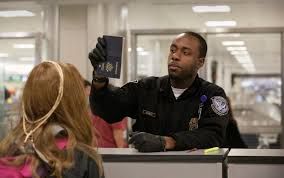Your Stress-Free Guide to Navigating U.S. Customs and Immigration
Sean Hornbeck
Tuesday, May 27, 2025
Here’s a detailed guide to help you navigate U.S. customs and immigration procedures effectively and with minimal stress:
Before You Travel
1. Documentation Preparation
- Passport: Ensure your passport is valid for at least six months beyond your intended stay in the U.S. (unless your country has a different agreement with the U.S.).
- Visa/ESTA:
- If required, have a valid U.S. visa or ESTA authorization (for travelers from Visa Waiver Program countries).
- Print or save electronic copies of your visa or ESTA confirmation.
- If required, have a valid U.S. visa or ESTA authorization (for travelers from Visa Waiver Program countries).
- Supporting Documents:
- Carry proof of your return flight or onward travel.
- Provide evidence of your stay (e.g., hotel reservations or a letter of invitation).
- Bring financial proof, such as bank statements, to show you can support yourself during your visit.
- Carry proof of your return flight or onward travel.
2. Customs Declaration
- Complete the U.S. Customs Declaration Form (provided during your flight or electronically via Mobile Passport Control).
- Declare all goods you are bringing, including food, cash over $10,000, or other restricted items.
- Familiarize yourself with the U.S. list of prohibited or restricted items.
3. Electronic Device Preparation
- Backup and clear sensitive data from phones, laptops, and tablets.
- If using a burner phone, ensure it has travel-related contacts and apps only.
- Log out of unnecessary accounts and apps, and disable biometric access if you’re concerned about privacy.
At the Port of Entry
1. Immigration Process
- Line Selection:
- Use the appropriate lane: U.S. Citizens/Permanent Residents or Visitors/Non-Citizens.
- Some airports have automated kiosks for pre-approved travelers (e.g., Global Entry).
- Use the appropriate lane: U.S. Citizens/Permanent Residents or Visitors/Non-Citizens.
- Interview with CBP Officer:
- Greet the officer politely and provide your passport and any required documents.
- Answer questions clearly and truthfully. Typical questions include:
- What is the purpose of your visit?
- How long do you plan to stay?
- Where will you be staying?
- Do you have family or friends in the U.S.?
- What is the purpose of your visit?
- Greet the officer politely and provide your passport and any required documents.
- Avoid jokes or sarcasm; take all questions seriously.
2. Customs Inspection
- Luggage Inspection:
- Your checked and carry-on bags may be inspected.
- Do not bring restricted items like fresh produce, plants, or animal products unless allowed.
- Your checked and carry-on bags may be inspected.
- Electronic Device Search:
- If asked, you may need to unlock your devices.
- If your burner phone raises questions, explain it’s for travel convenience or security.
- If asked, you may need to unlock your devices.
- Additional Screening:
- If selected for secondary screening, remain calm and cooperative. It’s often random or routine.
- If selected for secondary screening, remain calm and cooperative. It’s often random or routine.
Common Concerns
1. Privacy Rights
- U.S. Citizen/Resident: You cannot be denied entry, but refusal to comply with a search may delay your reentry.
- Foreign Nationals: Refusal to unlock devices or answer questions can lead to denial of entry.
- You may request to speak with a supervisor or legal counsel if you feel your rights are violated.
2. What to Declare
- Cash: Declare amounts over $10,000; failure can result in seizure.
- Food and Items: Even small snacks or gifts must be declared to avoid penalties.
- Medication: Bring prescriptions for any necessary medications, and ensure they’re in their original packaging.
After Immigration
- Collect your baggage and proceed to the exit area.
- If connecting to another flight, recheck your bags at the transfer counter.
- Keep your entry documents (e.g., I-94 form) safe during your stay.
Pro Tips
- Stay Organized: Have all documents easily accessible.
- Travel Light: Simplify your packing to speed up inspections.
- Politeness Matters: Being respectful and cooperative goes a long way in ensuring a smooth process.
Emergency Contacts: Have the contact information of your embassy or consulate handy, just in case.


About the Author
Sean Hornbeck
With over 20 years working in travel and tourism in various capacities, Sean travels the globe constantly looking for unique once in a lifetime experiences and experiences that remind us of the joy of life.
Join Sean in his travels as he shares insightful tales and connects with diverse communities worldwide.
Don't Miss Out On Your Next Dream Vacation!
Stay up to date with the latest travel information and exclusive cruise packages by signing up to our free newsletter below: